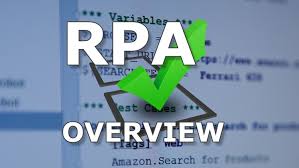What is RPA?
Robotic process automation (RPA) software is one of the fastest growing segments of the enterprise software market. RPA makes you creative by reducing your work load and automating the tasks.
RPA is mostly used in HR, Finance & Customer Engagement. Using a software bot, it automates the repetitive tasks thus allowing employee to focus on his work rather doing the work manually.
Demand for RPA:
The demand for RPA professionals has been a steady increase in India. With Large organizations are using RPA with Business process management and combining it with Artificial Intelligence to improve customer experience and reduce the cost by 50% which is a benefit for any industry it may be large scale or small scale.
Roles in RPA:
- Process Designer
- Automation Architect
- Production Manager
- RPA Developer
- RPA Tester
An average salary for an RPA Professional can range from 6 to 8 Lakhs making it the most lucrative career option to choose if you have interest in Automation.
Skills Needed to Become an RPA Professional:
Process: RPA is all about understanding of processes, implementing and executing it via a software code, if you want to be an RPA Pro you need have knowledge on programming languages.
RPA Modules: To become an RPA Pro you need to have hands on experience on these three RPA modules which includes UIpath, BluePrism and Automation Anywhere, for those especially beginners who do not know programming languages these tools will make your job much easier because using these tools you can create many kinds of bots.
Workflow Automation: Workflow mainly tells you (what will happen when) so that you can automate the entire process based upon the workflow you have created.
AI Alignment: Do you have a bit of AI Skills then make it worth. RPA in combine with AI becomes more adaptive to achieve process efficiency and superior customer engagement.
Growth: As I said earlier RPA is high on demand in India although on a fast growth path RPA is beginning to display signs of future potential with numerous opportunities.
Learn on the Job:
If you want to be perfect in any technology or a subject you need hands on training experience to understand the business process. RPA doesn’t need any subject knowledge all you need to understand is the process, once you understand the business process then you can apply RPA frameworks and make the whole thing automated using software tools.
Which Industry benefit from RPA Applications?
- Healthcare
- HR
- Telecom
- Insurance
- Retail Industry
- Travel & Logistics
Who are Eligible to Learn RPA?
- Fresh Graduates
- HRs
- Business Intelligence Professionals
- Flowchart Designers
- Digital Marketers
- IT Professionals
- Automation Learners
- Analysts
Any Graduate can learn RPA because it’s that easy all you need to understand is the typical business process implementation.
HR with Technology Facts:
66% – Return on investment (ROI) of hiring a candidate using HR technology is far greater than hiring through the traditional processes.
35% – Tech in HR impacts recruitment activities most, as compared to other functions.
48% – Organisations are using HR tech mostly to hire middle-level professionals.
33% – Robotic process automation (RPA) is the next big HR technology that companies will be investing in.
31% – Resistance from employees is the biggest barrier in adopting technology for HR processes.
30% – Lack of knowledge or technical skills is the second biggest hindrance for HR technology adoption.
Source: TimesJobs survey conducted among 1,380 HR leaders to decipher the impact of technology use in HR
Image Source: Google.com






Add comment